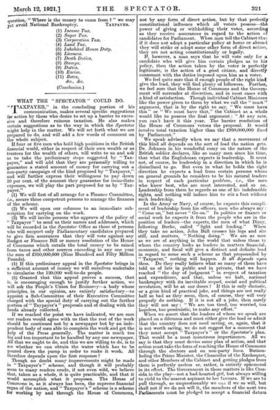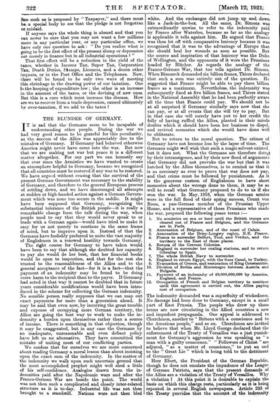WHAT THE " SPECTATOR " COULD DO. "T AXPAYER," in the
concluding portion of his communication, makes several specific suggestions for action by those who desire to set up a barrier to exces- sive and therefore ruinous taxation. He also makes certain suggestions as to the way in which the Spectator might help in the matter. We will set forth what we are prepared to do, and will add a few words of comment on the whole subject. If four or five men who hold high positions in the British financial world, either in respect of their own wealth or as trustees for the wealth of others, will write to us and ask us to take the preliminary steps suggested by " Tax- payer," and will add that they are personally willing to guarantee a stated amount of money for carrying out a non-party- campaign of the kind proposed by Taxpayer," and will further express their willingness to pay down 10 per cent. of the amount they guarantee for immediate expenses, we will play the part proposed for us by " Tax- payer." (1) We will first of all arrange for a Finance Committee, i.e., secure three competent persons to manage the finances of the scheme.
(2) We will open our columns to an immediate sub- scription for carrying on the work. (3) We will invite persons who approve of the policy of " Taxpayer " to send us their names and addresses, which will be recorded in the Spectator Office as those of persons who will support only Parliamentary candidates prepared to give firm assurances that they will vote against any Budget or Finance Bill or money resolution of the House of Commons which entails the total money to be raised from taxes and other sources exceeding in any one year the sum of £950,000,000 (Nine Hundred and Fifty Million Pounds). (4) If this preliminary appeal in the Spectator brings in a sufficient amount of money we will ourselves undertake to circularise the 120,000 well-to-do people. (5) Granted that this appeal proves a success, that is, is encouraging enough to justify further action, we will ask the People's Union for Economy—a body whose principles, in our opinion, are entirely satisfactory—to appoint a Sub-Committee of their Executive Committee charged with the special duty of carrying out the further portion of " Taypayer's " proposals and of dealing with the funds already collected.
If we reached the point we have indicated, we are sure our readers would agree with us that the rest of the work should be continued not by a newspaper but by an inde- pendent body of men able to complete the work and get the help of the Press generally. The matter is much too big and too important to be handled by any one newspaper. All that we ought to do, and this we are willing to do, is to see whether we can obtain the water which has to be poured down the pump in order to make it work. All therefore depends upon the first response ! Though no doubt many improvements might be made in " Taxpayer's " scheme, and though it will probably seem to many readers crude, if not even wild, we believe that, taken as a whole, it is quite practicable, and that it would accomplish what it proposes. The House of Commons is, as it always has been, the supreme financial organ of the nation, and Taxpayer's " scheme is a scheme for working by and through the House of Commons, not by any form of direct action, but by that perfectly constitutional influence which all voters possess—the power of giving or withholding their votes, according as they receive assurances in regard to the action of candidates for Parliament. When men tell the Cabinet that; if it does not adopt a particular policy at home or abroad they will strike or adopt some other form of direct action, they are not acting constitutionally or legally. If, however, a man says that he will vote only for a candidate who will give him certain pledges as to his policy, then the action taken by the voter is perfectly legitimate, is the action of a good citizen, and directly consonant with the duties imposed upon him as a voter.
We feel quite sure that if enough people of the right kind give the lead, they will find plenty of followers. Further, we feel sure that the House of Commons and the Govern- ment will surrender at discretion, and in most cases with a kind of satisfaction. Though individual Cabinet Ministers like the power given to them by what we call the " must " argument, that is. by the right to say, " We must have this " or " We must have that," the Cabinet as a whole would like to possess the final argument : " At any rate, you can't have it this year. The barrier resolution of the House of Commons vetoes the. proposal. It would involve total taxation higher than the £950,000,000 fixed by Parliament." We speak advisedly when we say that a movement of this kind all depends on the sort of lead the nation gets. Dr. Johnson in his wonderful essay on the nature of the British soldier declares, like so many men since his time, that what the Englishman expects is leadership. It must not, of course, be leadership in a direction in which he is disinclined to go. But even in what he holds the right direction he expects a lead from certain persons whom on general grounds he considers to be his natural leaders in respect of each particular problem, i.e., the men who know best, who are most interested, and so on. Leadership from them he regards as one of his indefeasible rights, and nothing will induce him to stir a foot without such leadership. In the Army or Navy, of course, he expects this compli- ment of leadership from his officers, men who always say : " Come on," but never " Go on." In politics or finance of social work he expects it from the people who are in the position of leaders—the experts, the men of what Dizzy, following Burke, called " light and leading." When they take no action, John Bull crosses his legs and sits still, and mutters, " Nothing doing." We are as sure as we are of anything in the world that unless those to whom the country looks as leaders in matters financial, economic, and fiscal will give a distinct and definite lead in regard to some such a scheme as that propounded by " Taxpayer," nothing will happen. It all depends upon them. Do they really believe what so many of them have told us of late in public and in private, that we have reached " the day of judgment " in respect of taxation and expenditure, and that, unless we halt, national bankruptcy with its inevitable sequel, social and political revolution, will be at our doors ? If this is only rhetoric, or a grim kind of practical joke, and things are not really half so bad as they seem, then, of course, they will very properly do nothing. If it is not all a joke, then surely they will not say : " We are too tired, too worried, too hopeless, too pessimistic, to make any effort." When we assert that the leaders of whom we speak are placed on a dilemma and must either give the lead or admit that the country does not need saving, or, again, that it is not worth saving, we do not suggest for a moment that they must accept Taxpayer's " or the Spectator's plan. That would be a most monstrous impertinence. All we say is that they must devise some plan of action, and that action must take the form of reaching the House of Commons through the electors and on non-party lines. Button- holing the Prime Minister, the Chancellor of the Exchequer, and other Members of the Cabinet and getting pledges from them is perfectly useless or, rather, is entirely ephemeral in its effect. The Government in these matters is like Cres- sida in the play—not a bad-hearted girl, but always willing to yield to the nearest aspirant to her favours. If we are to pull through, as unquestionably we can if we so will, but shall not if we do not will it, the members of the next two Parliaments must be pledged to accept a financial datum time such as is proposed by " Taxpayer," and there must be,. a special body to see that the pledge is not forgotten oe mislaid. If anyone says the whole thing is absurd and that you can never be sure that you may not want a few millions more in any particular year, or any particular office, we have only one question' to ask : " Do you realize what is going to be the first effect of the present slump or depression net merely in finance but in all industrial operations ? " That first effect will be a reduction in the yield of the taxes, whether in Income Tax, Super Tax, Corporation Tax, Death Duties, Stsmps, Licences, and a dozen other imposts, or in the Post Office and the Telephones. Now, than will be found to be only two ways of meeting this shrinkage in the drawing power of our taxation. One is.the keeping of expenditure low ; the other is an increase in- the amount of the taxes, or the devising of new ones. But this is a cure which must increase the disease. How areme to recover from a trade depression, caused ultimately by over-taxation, if we add to the taxes ?



































 Previous page
Previous page